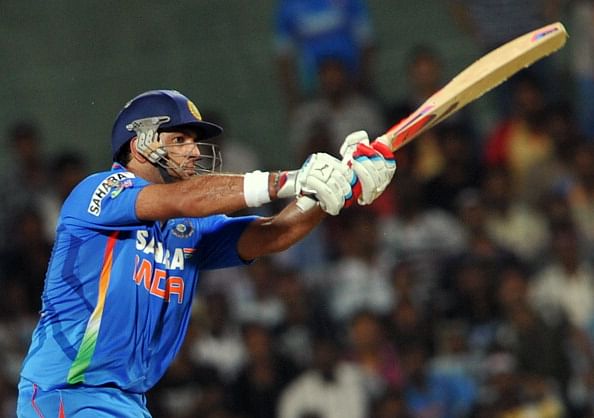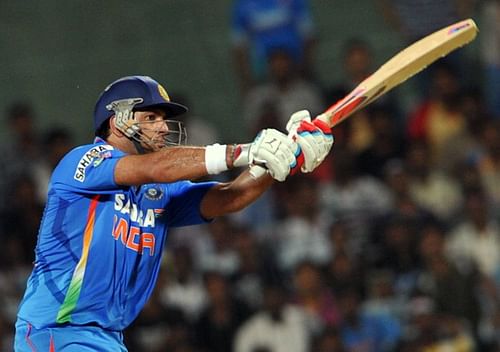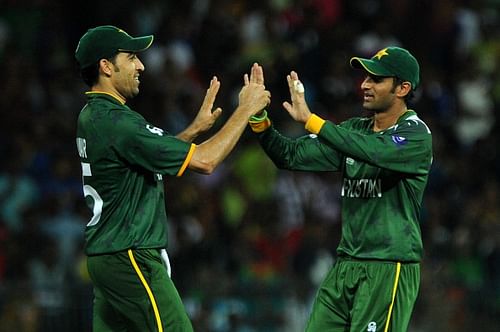
Yuvi storm blows away Pakistan at Motera

It’s not easy to evaluate an India-Pakistan cricket match. High octane levels, emotions swirling and tension running high – multiple factors to be taken into account even as objectivity demands highest priority. Especially in the second T20, considering that the Indian team was trailing their rivals and the series was poised at a knife’s edge.
Winning the toss was crucial, particularly considering that while the pitch promised runs for the batsmen, for the bowlers it spelled an equally nightmarish situation. It was a slow track with no prospect of turn for the bowlers. While the team batting first had the chance to get the most out of a non-friendly track for the bowlers, the dew and the moisture stood make the conditions even worse for the team bowling second. Taking a cue from the way the Indian batting order cracked up towards the end in the first T20I, the Pakistani skipper had no second thoughts about his decision to ask India to bat first after winning the toss.
Unlike the previous game where the Indian opening pair didn’t have a quick-fire beginning, Gambhir and Rahane took a different approach this time round. The flat track proved beneficial as the first fours yielded a flourish of boundaries. And just as it appeared that the Indian openers had their measure of the Pakistani bowling attack, Umar Gul sent both openers packing; first Gambhir, trapping him LBW with one that held back a little and then Rahane soon after, catching him off his own delivery. Within two overs, Pakistanis seemed to be inching ahead at a very crucial point.
Enter Yuvraj Singh and Virat Kohli. The Indian middle-order has in the past few years given the entire Indian cricketing contingent a lot of reasons to be thankful. And though it’s still seen with a little dubiousness at the Test level, the performance of the middle-order batsmen in the ODIs and T20s has often been brilliant. With Yuvraj necessarily holding at the other end, Kohli got the runs going for India yet again. Boundaries came freely, even as Mohammed Hafeez kept rotating his bowlers in a desperate bid to stem the runs. But as Kohli started the free-flow of boundaries, his abrupt departure in the 12th over ended his stay at the crease. A risky call by Yuvraj and a direct throw sent a fuming Kohli back to the pavilion. Yuvraj Singh however, made up for it by finishing with seven sixes and four fours. Bowlers after bowlers saw their efforts being hoisted into the stands and the Pakistani captain could simply stare at the soaring scorecard. Suddenly, the decision to field first seemed to have gone wrong from the Pakistani perspective.

But Umar Gul provided the breakthrough again, first by getting Yuvraj caught at the long-on boundary for this third wicket and then three balls later, by hitting the middle-stump of Dhoni. Gul’s unpredictability proved to be the saving grace for the Pakistanis as the Indian total was cut short by eight runs from the magical figure of 200.
In contrast to the Pakistani captain, MS Dhoni seemed to have a huge battle at his hands. With his captaincy being scrutinised with each match’s performance and his team selection choices being questioned even more, Dhoni had a lot of deal with. Opting for Ashwin over Ravindra Jadeja who was belted for quite a few runs in the previous match, Dhoni had Dinda, Sharma and the ever-dependable Yuvraj Singh to bolster the team’s attack. The hero of the first T20, Bhuvaneshwar Kumar was also a vital cog in this bowling line-up as was Suresh Raina who has proved the worth of his golden-arm in the slog overs.
Initially, as the Pakistani openers tore into the Indian bowling line-up, Wasim Akram’s comments on air about Dhoni’s captaincy seemed like gospel. The statement –“He throws the ball and then forgets about it” was priceless and wasn’t opposed, neither by his fellow commentators nor by the actions of the Indian skipper on the field. India found itself under severe attack, as Nasir Jamshed and Ahmed Shehzad made merry. But as soon as the feeling of déjà vu started sinking in, Ashwin in the 10th over and then Yuvraj in the 11th, broke the increasingly threatening partnership.
Mohammed Hafeez and Umar Akmal tried to counter the mounting run-rate and took the score to 146, before Dinda snapped the partnership in the 17th over. With the Pakistani captain still in the middle with Afridi and the Indian bowlers wobbly at best, the result was still open-ended. Two overs later, as Bhuvaneshwar Kumar sent back a threatening Afridi to the dug-out, both the Indian flags and fans came out soaring and roaring. Hafeez’s wicket and Kamran Akmal’s dismissal in the 19th over by Dinda were the final nails in coffin for Pakistan’s chances to wrap up the series, with Shoaib Malik and Umar Gul left to do the seemingly impossible task.
20 runs were needed in the final over and as Ishant Sharma prepared to take the run-up, the crowd waited with bated breath. Without bowling any extras and having conceded only 7 off the first 4 balls, India heaved a sigh of relief. 14 runs from two balls was not achievable and even though Sharma sent down a wide on the fifth ball of the over, the series’ fate was sealed.
A draw is always preferable to a loss. Invincible teams of the past bragged about their draws just as proudly as their wins. Maybe India and Pakistan aren’t exactly invincible by today’s cricketing standards, but this is one result that both teams would be happy about. There was no one winner or loser; it was ironically – a draw, the best result possible.